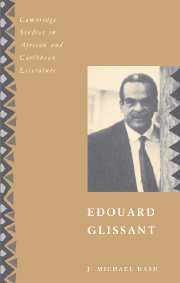Book contents
- Frontmatter
- Contents
- Acknowledgements
- Chronology
- Introduction
- 1 Contexts
- 2 The poetic intention: Un champ d'îles, La terre inquiète, Les Indes, Soleil de la conscience
- 3 Novels of time and space: La Lézarde, Le quatrième siècle
- 4 Writing the ‘real country’: L'intention poétique, Malemort, Boises, Monsieur Toussaint
- 5 Towards a theory of Antillanité: La case du commandeur, Le discours antillais
- 6 A poetics of chaos: Pays rêvé, pays réel, Mahagony, Poétique de la relation
- Notes
- Bibliography
- Index
6 - A poetics of chaos: Pays rêvé, pays réel, Mahagony, Poétique de la relation
Published online by Cambridge University Press: 29 September 2009
- Frontmatter
- Contents
- Acknowledgements
- Chronology
- Introduction
- 1 Contexts
- 2 The poetic intention: Un champ d'îles, La terre inquiète, Les Indes, Soleil de la conscience
- 3 Novels of time and space: La Lézarde, Le quatrième siècle
- 4 Writing the ‘real country’: L'intention poétique, Malemort, Boises, Monsieur Toussaint
- 5 Towards a theory of Antillanité: La case du commandeur, Le discours antillais
- 6 A poetics of chaos: Pays rêvé, pays réel, Mahagony, Poétique de la relation
- Notes
- Bibliography
- Index
Summary
The art of our time is noisy with appeals for silence.
Susan SontagGlissant's work in the eighties is marked by an increasing distrust of the written word and a marked unease with the literary text. This trend is already apparent in 1981. In La case du commandeur, Mycéa rejects Mathieu's continuous theorizing and defiantly accumulates feelings as mineralised units or ‘rocks’ within herself. In Le discours antillais, the exemplary artist of the Americas is not a writer but the Cuban sculptor Cardenas, who does not suffer from the constrictions of the ‘forced poetics’ of writing. This scepticism is intensified in the 1980s as later works question radically, even self-consciously at times, the role of the writer and the act of writing.
The grandiose concept of the writer as visionary, of writing as an ordering process and of the discours généralisant of intellectuals is the cause of great anxiety for Glissant in this decade. This disaffection was first glimpsed in his early anti-Mallarméan impulses. Glissant now fiercely rejects any belief that the world was meant to be raw material for a book or could be fully explained by any theory. The notion of Antillanité is never developed into a full-blown theory. On the contrary, Glissant seems to move towards a more thoroughgoing exploration of models of disorder or chaos.
The implications of his new emphasis on unpredictability are significant. It means that his notion of opacité is given further prominence as he explores more singlemindedly the realm of the intuitive and the indeterminate as a corrective response to the systematizing pressures of assimilation and deculturation.
- Type
- Chapter
- Information
- Edouard Glissant , pp. 155 - 182Publisher: Cambridge University PressPrint publication year: 1995

